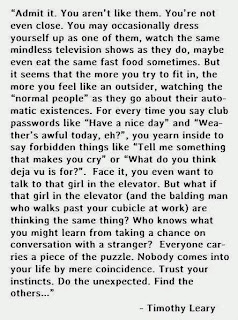"It
must've been meant to be," the phrase came, trippingly. And I halted.
Semantics and colloquialisms and idioms abound in every culture; hoist us on
their petards. Within, we may become ineluctable victims. Without, we may
easily perpetuate phraseology. And overall the shaping of our minds may be such
that we react, respond, think and feel along with our sayings, or perhaps even
worse, are not aware of what we're saying at all. Like do-do in the wind.
Predestination
is a fascinating concept. We more easily ascribe it to an individual than to a
group. Those souls in the towers of 9/11 could hardly have been predestined to
be there; yet we believe he or she who was meant to be there, but missed the
bus, was meant not to be there? Not quite like our concept of karma, with its
overall sense of retribution or just rewards, or like Newton's laws of action
producing equal and opposite reaction, we take predestination to mean some
magical, mystical, religious or spiritual event that was, well, "meant to
be." So we open our sails and set loose upon the seas of fortune, favour,
and storms. We fall on our knees and break a knee cap (at 90 plus years old).
We have a stroke. We have an accident. We miss that bus. We receive an award.
Our book is published. We manage to finish the painting, or not. We win the lottery. "If you're to have
it, it will be meant to be, or not." Ha! One may as well not stir.
Hubris,
ego, narcissism, and selfishness invest themselves in our language, our
culture, our outlook. We almost cannot imagine ourselves not being conscious.
Heaven and many mansions hereafter buoy our hopes. Ambition and perseverance
and belief invigorates us. We are naturally given to crossing our fingers, to
lopping off rabbits' feet, to throwing the bones. And despite all the chance
and circumstance and ceremony, we instinctually adhere to phrases such as,
"it's meant to be." After all, somewhere outside of ourselves is a
coincidence of points that opens luck's door at the precise right time; that
turns the traffic light green; that allows for our precision of presence when
John Cleese sits down right in front of us at the London theatre; that brings
about the dropping of the crystal salad-bowl. It was "meant to be."
That parking spot made available just as we arrived, or not; that money found
on the pavement; the glove lost; the letter not delivered; the recalled hug
given that may well have been the very last, "meant to be"?
Malcolm
Gladwell has it that there are three coordinates that usually occur for more
than kismet to be made: thousands of hours to be poured into the work; a
support network of backup people; and chance. The painting may well have taken
15 years to produce; there may well have been some 8,000 people who saw it at
the art show; but without that one special person who has the right
connections, the influence, the insight, the clout, the interest, and the
wherewithal the painting in question goes back to the artist's studio, to be
stacked up with other projects that might never see ‘the light of day’. So it
goes. Imagine if the latest art treasure haul had not been hidden from the
nazis by one man? Ah well, hiding it was "meant to be."
Fatalism
has its flaws. Prayer and hope and luck and instinct have theirs too. And
whether we win or lose, shall we in the end say, "It was meant to
be"? Meant by whom? And if meant, then why should one struggle so to do,
to overcome, to fix, to right, to address, to achieve, if it all was meant to
be, or not? Why do both sides in sports teams bend alike to pray before competition?
Whenever
I succeed, or not, it has or shall not have been entirely due to my own
artifice; there be hundreds of persons involved in the steps along my personal
way, and each have impacted my getting to this very 'point in time'. But not
one of them is in the least bit as responsible for me as I myself am. Like your
reading this, or not. Indeed, just as it was all meant to be? Pet phrases can
be cute, indeed, but then again, they can be cumbersome. Or do I blather
against the wind? Hm? Should one just leave things as they're meant to be?


No comments:
Post a Comment
Thanks for your contribution, by way of comment toward The Health of the Whole, always!